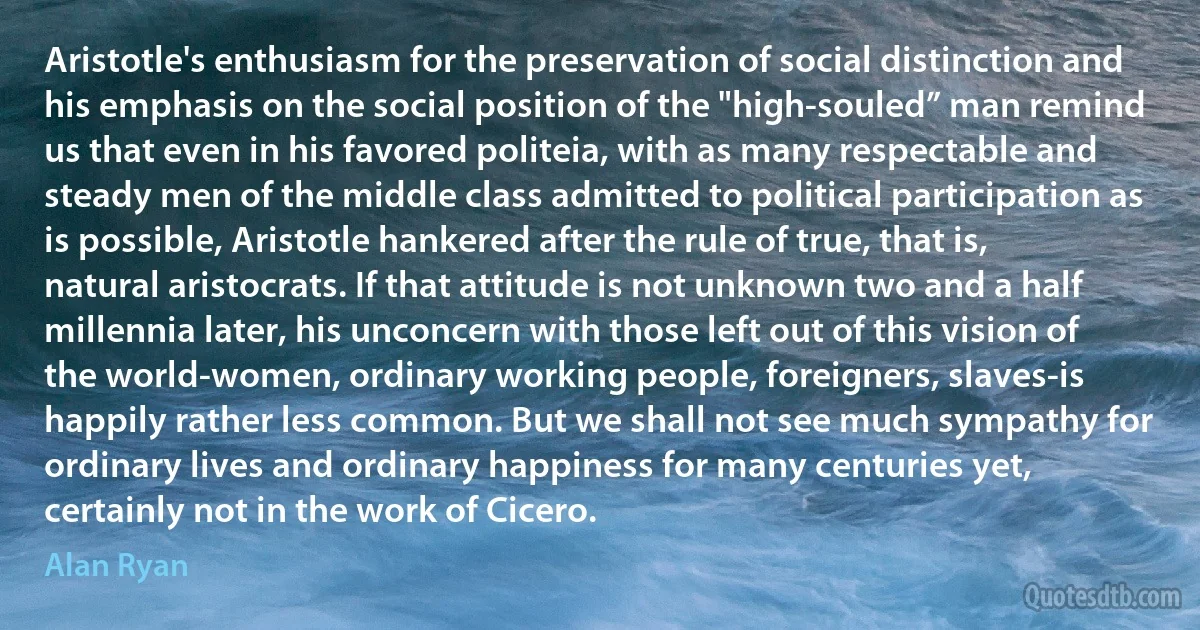
Aristotle's enthusiasm for the preservation of social distinction and his emphasis on the social position of the "high-souled” man remind us that even in his favored politeia, with as many respectable and steady men of the middle class admitted to political participation as is possible, Aristotle hankered after the rule of true, that is, natural aristocrats. If that attitude is not unknown two and a half millennia later, his unconcern with those left out of this vision of the world-women, ordinary working people, foreigners, slaves-is happily rather less common. But we shall not see much sympathy for ordinary lives and ordinary happiness for many centuries yet, certainly not in the work of Cicero.
Alan RyanRelated topics
common emphasis half happiness men later left less lives man middle millennium natural participation people position possible preservation respectable rule see unconcern unknown vision work working yet aristotleRelated quotes
As a rule, white abolitionists either defended the industrial capitalists or expressed no conscious class loyalty at all. This unquestioning acceptance of the capitalist economic system was evident in the program of the women's rights movement as well. If most abolitionists viewed slavery as a nasty blemish which needed to be eliminated, most women's righters viewed male supremacy in a similar manner-as an immoral flaw in their otherwise acceptable society. The leaders of the women's rights movement did not suspect that the enslavement of Black people in the South, the economic exploitation of Northern workers and the social oppression of women might be systematically related.

Angela Davis
Since I shall be indicating my disagreement with some of the points made by Professor Israel Kirzner, let me stress that I am in complete sympathy with his point of departure, namely, the emphasis on the dispersion of information among economic decision-making units (called by him, "Hayek's knowledge problem") and the consequent problem of transmission of information among those units.
Much of my own research work since the 1950s has been focused on issues in welfare economics viewed from an informational perspective. The ideas of Hayek (whose classes at the London School of Economics I attended during the academic year 1938-39) have played a major role in influencing my thinking and have been so acknowledged.

Leonid Hurwicz
No one mentioned Communism or the Hiss Case until we sat over our coffee in the living room. Mrs. Philip Jessup had just used her personal good offices to try to get me off TIME. Luce was baffled by the implacable clamor of the most enlightened people against me. "By any Marxian pattern of how classes behave," he said, "the upper class should be for you and the lower classes should be against you. But it is the upper class that is most violent against you. How do you explain that?" "You don't understand the class structure of American society," said Smetana, "or you would not ask such a question. In the United States, the working class are Democrats. The middle class are Republicans. The upper class are Communists."

Whittaker Chambers
As we saw, there is a large class of personal names and name-elements common to the Late Books and hymns of the Rigveda (386 hymns in the Late Books of the Rigveda and 8 Late hymns in the earlier Books), and to the Avesta (the bulk of the names, right from the name of the first composer of the Avesta, and the names of his closest associates), the Mitanni (including every common name element known), and the Kassites (the only known name). These names and name-elements are fundamental to all four groups, but completely absent in the Early and Middle Books of the Rigveda (apart from the 8 Late hymns mentioned earlier). And all these names and name-elements are very common in post-Rigvedic texts.

Shrikant Talageri
Political repression in the United States has reached monstrous proportions. Black and Brown peoples especially, victims of the most vicious and calculated forms of class, national and racial oppression, bear the brunt of this repression. Literally tens of thousands of innocent men and women, the overwhelming majority of them poor, fill the jails and prisons; hundreds of thousands more, including the most presumably respectable groups and individuals, are subject to police, FBI and military intelligence surveillance. The Nixon administration most recently responded to the massive protests against the war in Indochina by arresting more than 13,000 people and placing them in stadiums converted into detention centers.

Angela Davis
